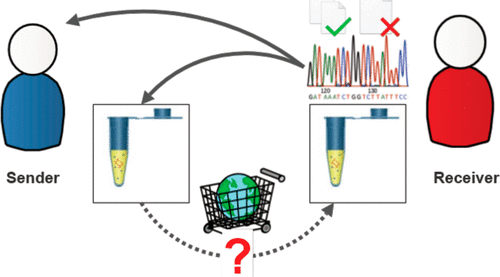当前位置:
X-MOL 学术
›
ACS Synth. Biol.
›
论文详情
Our official English website, www.x-mol.net, welcomes your
feedback! (Note: you will need to create a separate account there.)
Securing the Exchange of Synthetic Genetic Constructs Using Digital Signatures.
ACS Synthetic Biology ( IF 3.7 ) Pub Date : 2020-09-11 , DOI: 10.1021/acssynbio.0c00401 Jenna E Gallegos 1 , Diptendu M Kar 2 , Indrakshi Ray 2 , Indrajit Ray 2 , Jean Peccoud 1, 3
ACS Synthetic Biology ( IF 3.7 ) Pub Date : 2020-09-11 , DOI: 10.1021/acssynbio.0c00401 Jenna E Gallegos 1 , Diptendu M Kar 2 , Indrakshi Ray 2 , Indrajit Ray 2 , Jean Peccoud 1, 3
Affiliation

|
The field of synthetic biology relies on an ever-growing supply chain of synthetic genetic material. Technologies to secure the exchange of this material are still in their infancy. Solutions proposed thus far have focused on watermarks, a dated security approach that can be used to claim authorship, but is subject to counterfeit, and does not provide any information about the integrity of the genetic material itself. In this manuscript, we describe how data encryption and digital signature algorithms can be used to ensure the integrity and authenticity of synthetic genetic constructs. Using a pilot software that generates digital signatures and other encrypted data for plasmids, we demonstrate that we can predictably extract information about the author, the identity, the integrity of plasmid sequences, and even annotations from sequencing data alone without a reference sequence, all without compromising the function of the plasmids. Encoding a digital signature into a DNA molecule provides an avenue for genetic designers to claim authorship of DNA molecules. This technology could help compliance with material transfer agreements and other licensing agreements.
中文翻译:

使用数字签名保护合成遗传结构的交换。
合成生物学领域依赖于不断增长的合成遗传材料供应链。确保这种材料交换的技术仍处于起步阶段。迄今为止提出的解决方案主要集中在水印上,这是一种过时的安全方法,可用于声明作者身份,但容易被伪造,并且不提供有关遗传材料本身完整性的任何信息。在这份手稿中,我们描述了如何使用数据加密和数字签名算法来确保合成基因结构的完整性和真实性。使用为质粒生成数字签名和其他加密数据的试点软件,我们证明我们可以可预测地提取有关作者、身份、质粒序列完整性的信息,甚至在没有参考序列的情况下仅从测序数据中进行注释,所有这些都不会影响质粒的功能。将数字签名编码到 DNA 分子中,为基因设计者提供了一条获得 DNA 分子作者身份的途径。这项技术可以帮助遵守材料转让协议和其他许可协议。
更新日期:2020-10-17
中文翻译:

使用数字签名保护合成遗传结构的交换。
合成生物学领域依赖于不断增长的合成遗传材料供应链。确保这种材料交换的技术仍处于起步阶段。迄今为止提出的解决方案主要集中在水印上,这是一种过时的安全方法,可用于声明作者身份,但容易被伪造,并且不提供有关遗传材料本身完整性的任何信息。在这份手稿中,我们描述了如何使用数据加密和数字签名算法来确保合成基因结构的完整性和真实性。使用为质粒生成数字签名和其他加密数据的试点软件,我们证明我们可以可预测地提取有关作者、身份、质粒序列完整性的信息,甚至在没有参考序列的情况下仅从测序数据中进行注释,所有这些都不会影响质粒的功能。将数字签名编码到 DNA 分子中,为基因设计者提供了一条获得 DNA 分子作者身份的途径。这项技术可以帮助遵守材料转让协议和其他许可协议。









































 京公网安备 11010802027423号
京公网安备 11010802027423号